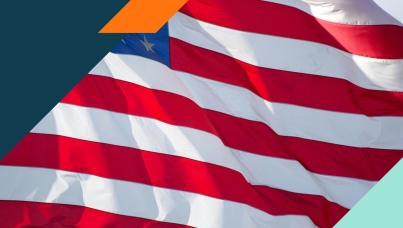Concerns about COVID-19, election interference loom as November nears
Washington, DC, July 30, 2020 – As the U.S. elections near, a new Newsy/Ipsos poll shows that a majority of Americans are concerned about the impact of COVID-19, foreign interference, and other factors that could impact the outcome. Additionally, the COVID-19 pandemic tops the list of most important political issues, with slightly more Americans citing this as a top issue compared to last month. Regarding a return to school, most parents of a school-aged child would be uncomfortable with their child or children returning to in-person school this fall. However, the poll reveals a massive perceived gender gap in responsibility for childcare if school is at least partially online, with moms more likely than dads to say they would be handling most childcare.
Detailed Findings
More than half of Americans are concerned about the impact of COVID-19, fraud, interference and suppression on the upcoming 2020 elections. Slightly more Americans continue to think that Democrat Joe Biden will be elected in the upcoming presidential election this November.
- Around three-quarters of Americans are concerned about the impact of COVID-19 (79%) and fake news (71%) on the upcoming 2020 elections. Sixty-three percent are concerned about foreign interference, and more than half express concern about voting issues including vote suppression (63%), voter fraud (58%), and mail-in ballot fraud (54%).
- While Republicans are most likely to be concerned about fake news, Democrats are most likely to be concerned with COVID-19 and vote suppression. • More Americans think that Democrat Joe Biden will likely win in November (41%) rather than President Trump (37%). This is in line with findings last month (Biden 42%, Trump 38%).
- More Republicans (45%) support rather than oppose (35%) President Trump staying in office if he were to lose the election. Just 23% of Americans overall support this.
More Americans this month believe that the COVID-19 pandemic is one of the most important political issues right now.
- Half of Americans (51%) believe that one of the three most important political issues is the COVID-19 pandemic. This is up from 45% saying the same late last month.
- The pandemic is followed by the economy and jobs (33%) and health care (32%), which remain statistically unchanged from last month.
- Right now, one in four Americans (24%) cite racial inequality as one of their most important issues, down from 31% last month. This is still dramatically higher than the 7% who said the same in December of 2019. This month, it remains a top issue for 53% of Black Americans and 43% of Gen Zers.
More Americans currently working from home would prefer to continue to do so once it is safe. Similarly, most parents of school-aged children would be uncomfortable with sending them to in-person classes in the fall.
- While 47% of Americans currently working from home would prefer to continue doing so, 41% would prefer to return to the office once it is safe. Those with a child under 18 years old in their household are more likely to prefer returning to the office (48%) than those without children at home (36%).
- The plurality of parents with a child attending elementary, middle or high school in the fall are uncomfortable with the idea of the child or children returning to full time, in-person schooling. This is particularly concerning for Democrats (76%), those who are unemployed (70%), and non-white Americans (71%).
With many parents waiting to see if school will be at least partially online, a massive perceived gender gap exists regarding responsibility for childcare.
- Overall, 43% of parents say the will personally handle most of the child care if schools are at least partially online or virtual this fall. This is followed by another quarter who say their partner or spouse will take on this role. Less than one in ten will rely on grandparents (3%), an ex-partner (2%), or an other family member (8%). Just 7% say their child will be back in school full time, and very few parents will hire a private teacher or tutor (3%).
- Females (62%) are twice as likely as males (26%) to say they will mostly handle child care themselves.
- Males (39%) are nearly four times as likely as females (10%) to say their partner or spouse will mostly handle this and two times as likely as females to say another family member will do so (11% of males vs. 5% of females).
About the Study
These are some of the findings of an Ipsos poll conducted between July 24-29, 2020, on behalf of Newsy. For this survey, a sample of 2,015 adults age 18+ from the continental U.S., Alaska, and Hawaii was interviewed online in English. This poll is trended against Newsy/Ipsos polls conducted between June 25-29, 2020, with a sample of 2,008 U.S. adults, February 21-25, 2020, with a sample of 2,010 U.S. adults, and December 16-17, 2019, with a sample of 1,005 U.S. adults.
The sample for this study was randomly drawn from Ipsos’ online panel (see link below for more info on “Access Panels and Recruitment”), partner online panel sources, and “river” sampling (see link below for more info on the Ipsos “Ampario Overview” sample method) and does not rely on a population frame in the traditional sense. Ipsos uses fixed sample targets, unique to each study, in drawing a sample. After a sample has been obtained from the Ipsos panel, Ipsos calibrates respondent characteristics to be representative of the U.S. Population using standard procedures such as raking-ratio adjustments. The source of these population targets is U.S. Census 2016 American Community Survey data. The sample drawn for this study reflects fixed sample targets on demographics. Posthoc weights were made to the population characteristics on gender, age, race/ethnicity, region, and education.
Statistical margins of error are not applicable to online non-probability polls. All sample surveys and polls may be subject to other sources of error, including, but not limited to coverage error and measurement error. Where figures do not sum to 100, this is due to the effects of rounding. The precision of Ipsos online polls is measured using a credibility interval. In this case, the poll has a credibility interval of plus or minus 2.5 percentage points for all respondents. Ipsos calculates a design effect (DEFF) for each study based on the variation of the weights, following the formula of Kish (1965). This study had a credibility interval adjusted for design effect of the following (n=2,015, DEFF=1.5, adjusted Confidence Interval=+/-4.0 percentage points).
The poll fielded from December 16-17, 2019, has a credibility interval of plus or minus 3.5 percentage points, and the polls fielded from February 21-25, 2020, and June 25-29, 2020, have a credibility interval of plus or minus 2.5 percentage points.
For more information on this news release, please contact:
Mallory Newall
Director, US
Public Affairs
+1 202 420-2014
[email protected]
Kate Silverstein
Media Relations Specialist, US
Public Affairs
+1 718 755-8829
[email protected]
About Ipsos
Ipsos is the world’s third largest market research company, present in 90 markets and employing more than 18,000 people.
Our passionately curious research professionals, analysts and scientists have built unique multi-specialist capabilities that provide true understanding and powerful insights into the actions, opinions and motivations of citizens, consumers, patients, customers or employees. We serve more than 5000 clients across the world with 75 business solutions.
Founded in France in 1975, Ipsos is listed on the Euronext Paris since July 1st, 1999. The company is part of the SBF 120 and the Mid-60 index and is eligible for the Deferred Settlement Service (SRD). ISIN code FR0000073298, Reuters ISOS.PA, Bloomberg IPS:FP www.ipsos.com



